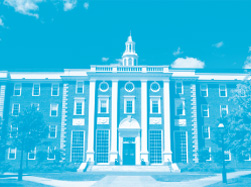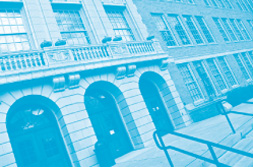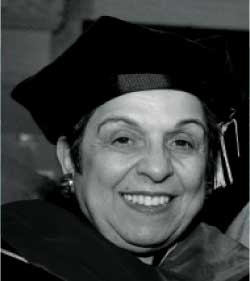Educating The Public About Public Education
Former TC faculty member Donna E. Shalala has served in two presidential administrations and presided over three universities. In excerpts adapted from an interview for the Teachers College Oral History Project, she reflects on an unplanned career that has given her a unique perspective on why public schools matter.
A couple of years ago, our School of Education and Human Development at the University of Miami asked me to teach a course on the politics of education. They said, in essence, "We've got these kids from Teach for America, and they have no idea how the school system is organized or what the politics are. They have no context for understanding what's going on."
I hadn't taught the politics of education since I was a Teachers College faculty member in the 1970s, but doing so has turned out to be a very powerful experience for me -- a return to my intellectual roots and a window into issues that are critical to where we're headed as a nation.
I should say at the outset that I never planned my career. I went to public school in Cleveland, where my mother taught and later served on the school board. After college, I went into the Peace Corps and ended up in graduate school at Syracuse University, following a boyfriend. There I studied with political scientists and economists who were interested in the politics and economics of state and local government. They also had foundation support to study school-finance equity issues.
Then I came to New York City, because it seemed like an interesting place to be. My initial focus was on state and local politics when teaching in the City University of New York system, where my chairman assured me that no woman would ever get tenure. I was pretty miserable.
I came to TC because I had been a Spencer Fellow and because Lawrence Cremin, the great historian of American education (and President of Teachers College from 1974 to 1985), was putting together a group of social scientists that could approach education from different perspectives. Larry was thinking about education as more than just schooling or a reflection of the influence of the federal government or state government or the business community. His outlook was interdisciplinary, and he got a number of us to think more broadly about schools, and in particular about what was most important in terms of learning. Had a child eaten enough breakfast that morning? Were there health issues that needed to be dealt with for children to learn? Was the family's poverty creating a poor learning environment at home?
Larry's belief that everyone should work with everyone else made Teachers College a very collegial place. You felt that you were supposed to wander around and talk to people -- to learn about other disciplines instead of just having tunnel vision about your own field. I sat next door to the anthropologist Lambros Comitas (Gardner Cowles Professor of Anthropology and Education). I ate lunch with Edmund Gordon (now Richard March Hoe Professor Emeritus of Psychology and Education), who was another TC icon, and I hung around Maxine Greene (now William F. Russell Professor Emerita in Foundations of Education and Professor Emerita of Philosophy and Education), because as a philosopher, she had a unique way of looking at teaching and at teachers. She made you read things and talk to her about them.
Because of Larry, I, in turn, ran my graduate program like a kibbutz with Ford Foundation grants, thanks to a gifted program officer, Jim Kelly (now Senior Advisor to the Dean of the School of Education at the University of Michigan). All of my graduate students came together in a space on top of one of the TC buildings that you had to go outside to get to. During that period, I had some of the best Ph.D.s that ever came out of TC. Susan Fuhrman, of course, was one. Allan Odden, who now has an endowed chair at the University of Wisconsin-Madison [and serves as Director of Strategic Management of Human Capital in public education], was another. We had a student from Israel, Elad Peled, who went on to become Director-General of Israel's Ministry of Education and Culture. His higher education at that point consisted of having attended the National Defense College in Israel, but we admitted him for the Ph.D. program, and he was probably one of the most brilliant students I've ever taught. I also chaired a dozen doctorates for the nursing program at TC, and that was my first contact with the health care system.
These were all very smart people who were a bit older and who had already done interesting things in the world. At TC, we brought them together to work as a group. One year we accepted a contract with the State of Connecticut to reform the school finance system. It was highly statistical work, because the state was under court order to make its educational finance system fairer. Every week, we drove up to Hartford, and we not only gave the state legislature alternatives, we also taught the students how to work within the policy realms.
Teaching the politics of education again after all these years has made me realize just how valuable those experiences were. In my own career, TC positioned me for my subsequent roles in the U.S. Department of Housing and Urban Development, in helping to launch the federal Department of Education, in running the U.S. Department of Health and Human Services, and even for the recent role I had chairing the Institute of Medicine Committee on the Future of Nursing.
But beyond its impact on me, TC has provided generations of educators and policymakers with the kind of cross-disciplinary outlook that our education system absolutely cries out for today. Our nation is dealing once again with waves of immigrants, and I believe, the way Larry Cremin did, that public schools are still the melting pots in our society. They are the places where most children spend most of their time, where they go to become Americans, and where, ultimately, we create character, citizenship and patriots. Charter schools are an interesting experiment, but too many of them have engaged in "creaming," taking only the best students. The whole point of the public school system is to reach as deep as you possibly can and create opportunity for as many young people as possible.
If we don't make our public schools work, we're all going to pay the price, because we no longer have an economy that can absorb people who drop out. Those career paths simply don't exist anymore, so we've got to find a way to make the schools relevant and keep all young people in school. And that means thinking about education as Larry Cremin did, as Edmund Gordon does, as Maxine Greene does. It means putting our resources into creating schools that really do teach to the whole child and that meet the needs of families and communities, instead of simply preparing students to score higher on tests. It means paying teachers enough, making sure they're well trained and making sure you can sustain them in the schools, because, more often than not, great teachers are made rather than born.
At the end of the day, the quality of a child's education ought not to depend on who their parents are and where they live. Access to quality schooling is fundamental to being an American, and ensuring it is the government's responsibility -'" federal, state and local -'" not the responsibility of wealthy people supporting a charter school. In a sense, it is also the continuing responsibility of Teachers College, which, more than any other institution I know, has educated the world about public education so well and for so long.
Published Thursday, Jun. 27, 2013




